Increasing Number of UK Graduates Taking Non-Degree Roles
UK graduates who fail to prepare strategically for the job market often end up taking low-pay, low-skilled, and non-graduate jobs with low job satisfaction just to survive. Many studies have found this anomaly a growing concern.
For example, SIA (2023) found the ratio to be over 4 in 10 graduates (42%), and CIPD (2022) therefore recommended a significant shift in UK skills policy and emphasised the urgent need for better career advice for students.
Learn four practical ways to overcome graduate underemployment by preparing for in-demand IT roles.
Information technology jobs — turn the tide in your favour
The IT sector is lucrative, and anyone, not only computer science majors, can get into it. Preparing for an entry-level role is one sure-fire way to break into the sector right after graduation.
Information technology jobs are among the top job shortages in the UK. The roles differ. For example, QA tester, network systems, programming, software development, and DevOps engineering. Cloud architecture, business analysis, AI engineering, information security analysis, and software engineering are others. Research each role in more depth before you choose one. You can start as a junior and climb the ladder.
But where do I start?
So, you might be asking by now, ‘How can a BSc in economics undergraduate like me prepare for a career in IT?’ Let’s explore four tactics:
- Come to terms early that you can have a lucrative career different from your academic discipline
The key is to decide early.
It is a reality that not everyone with a BSc in economics, for example, ends up working as an economist. Job markets have changed. People look at the jobs available and retrain to take up those roles. It is even better to decide, settle for, and prepare for such a switch 12-18 months before graduating.
Many people have followed this route successfully. One example is John, one of my former undergraduates. I taught John finance at the University of Calabar, Nigeria. He ended up becoming a software engineer.
How did this happen?
During John’s 5-year bachelor’s programme in banking and finance, he used the long holidays during the last 2 years to undertake short courses in coding. He also got some certifications. When he graduated, it was his coding skills that got him a job, not his banking and finance degree.
To consolidate his commitment to this new field, in 2021, he was admitted into the University of Westminster’s Master in Software Engineering programme. He completed the programme in 2022 and landed his current London job even before graduation.
I get that things may not always pan out as planned — yet, you may never know until you try. - Start becoming a professional (get certified!)
Qualifying as a professional in a real-world job title always gets you a job quicker than a generic academic name (such as a BSc in Computer Science).
Even if you were a computer science major, you could still struggle to find a job quicker than your classmates who were equally trained but have in-demand qualifications; for example, Certified iOS App Developer certification. - Leverage the university’s LinkedIn alumni page
LinkedIn provides universities with an alumni page feature. This tool can help you find the support you need from alumni—connect with people in your chosen field, contribute, ask questions, receive guidance, arrange informational interviews and mentoring, seek job referrals, etc.
Here’s how it works:
1. Open the LinkedIn search function and type University of Westminster 2. Click ‘University of Westminster’
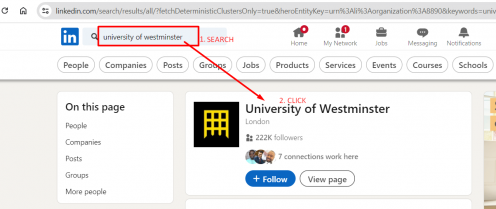
3. Click ‘Alumni’
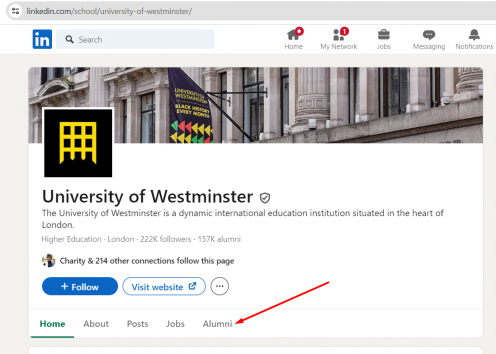
- You’ll see all the alumni and their profiles:
• ‘Where they work’
• ‘Where they live’
• ‘What they do’
• ‘What they are skilled at’
• ‘What they studied’
• ‘How you are connected’
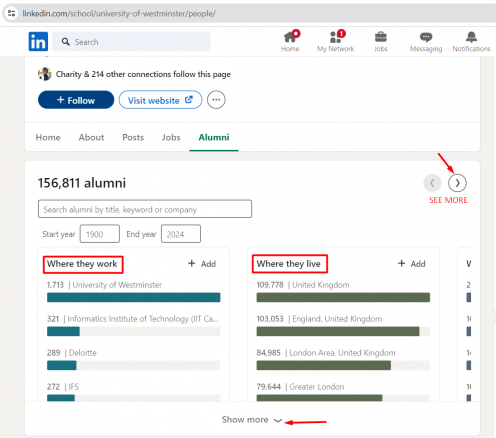
- You can further filter any of the six features in No. 4 to find more information.
Let’s say you’re interested in connecting with Westminster alumni who are iOS developers in the Greater London area:
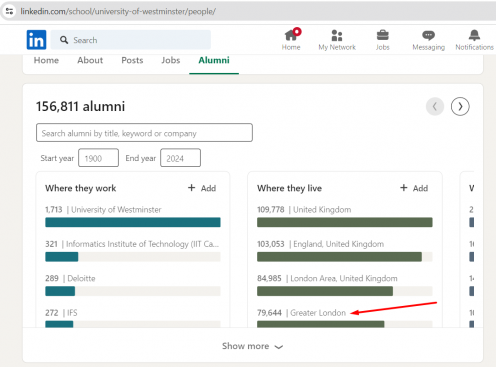
6. Now, you can further filter to reach people with your job role of interest—iOS development:
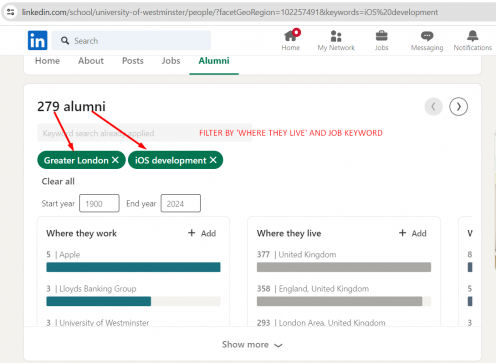
- You’ll find 279 alumni in Greater London, 151 working as iOS developers.
Then, filter to see their organisations. You can reach out with a customised message introducing yourself as a current student and move the conversation from there.
A similar alumni connection strategy is what got Chika her first IT role [after being unemployed for 13 months, even with a first-class degree]:
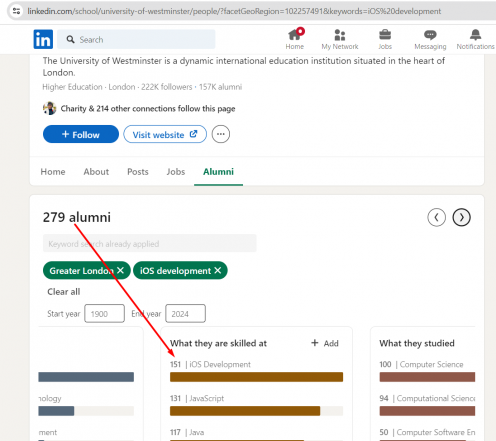
- Develop value validation projects (VVP) to showcase your learning and expertise
For example, as an iOS developer, you can build simple, fun games to demonstrate your skills. Or even complex projects like apps, personally or as a group, and document them on your portfolio on GitHub.
Look for and solve real-life problems. Later on, when you’re applying for jobs, you can use these to showcase your skills. These will look good on your CV. It’s much better than telling potential employers, ‘I have iOS development skills’, or merely listing items in a skills bar in a CV.
Key Takeaways
• Decide early: Consider IT careers outside your current academic discipline and prepare to take those opportunities well before graduation.
• Get certified: Gaining relevant certifications can significantly improve your employability.
• Build a portfolio: Start developing personal projects to show your technical skills to potential em-ployers and provide tangible proof of your capabilities.
• Network with alumni through LinkedIn: Use LinkedIn to connect with relevant industry profession-als and seek further guidance or job referrals.
• Real-life possibilities: If John, from a finance background, could switch to software engineering through self-study and certification, it proves you too can, with these strategies.
***
Big thanks to Ita John for this useful article!

Remember: if you need careers support, your Careers Team is only an email / a message away!
E: careers@westminster.ac.uk| Website | Facebook | Twitter | Instagram |Careers Blog
- An End-to-End Guide to Applying for Jobs: Where and When to Start! - 22 December 2025
- Graduate Success Series: a conversation with Ying Zhang - 18 December 2025
- Why Purpose is Your Greatest Asset in Higher Education - 23 October 2025

This is a great article with actionable advice for undergraduates interested in IT careers. It would be helpful to include a list of specific skills employers are looking for in entry-level IT positions. Thanks for sharing.
I enjoyed reading this. Thanks a lot.
I would only add that as an IT person myself, people should not be scared of coding
– “Tech jobs are not just about coding.”
Many think IT means only programming.
But what about your soft skills?
Roles in tech also need communication and teamwork.
Could your strengths be better used elsewhere?
Thank you so much, Mr Ita John, for always giving positive encouragement, ideas, support and mentorship on how to achieve academic excellence.
This is so eye-opening to read. As they say, tech is the future, and the future is now! Learning coding or data analysis can open many doors. Tech companies are always looking for smart, curious people. Start small, grow big—tech lets you do that.